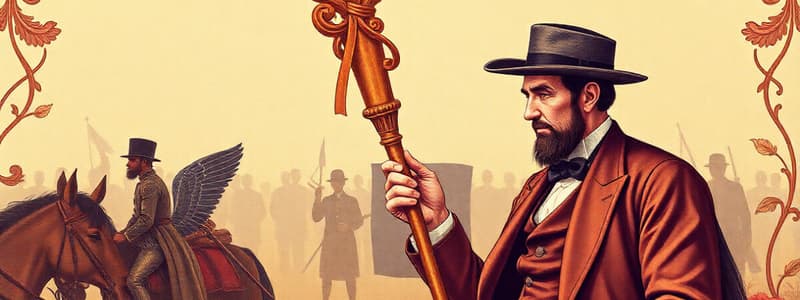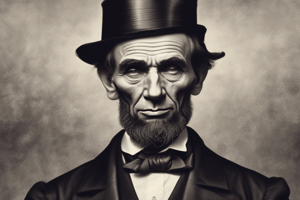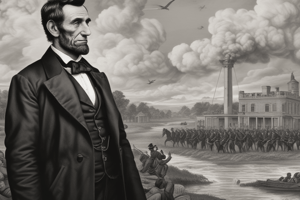Podcast
Questions and Answers
What was Abraham Lincoln's main goal during his presidency?
What was Abraham Lincoln's main goal during his presidency?
- To promote economic growth in the South
- To end slavery across the United States
- To keep the Union together (correct)
- To support Southern states' rights
What triggered South Carolina's decision to secede from the Union?
What triggered South Carolina's decision to secede from the Union?
- Economic struggles in the South
- The election of Lincoln (correct)
- Pressure from wealthy plantation owners
- The threat of Northern invasion
How did Georgians feel about secession?
How did Georgians feel about secession?
- All Georgians opposed secession due to economic concerns
- Opinions were divided between pro and anti-secession factions (correct)
- Only plantation owners supported secession
- There was unanimous support for leaving the Union
What concern did Alexander Stephens express regarding civil war?
What concern did Alexander Stephens express regarding civil war?
Who were the 'fire eaters' in Georgia's secession debate?
Who were the 'fire eaters' in Georgia's secession debate?
What type of farms did those opposing secession in Georgia typically own?
What type of farms did those opposing secession in Georgia typically own?
What role did Alexander Stephens take after Georgia seceded?
What role did Alexander Stephens take after Georgia seceded?
What happened to Alexander Stephens after the Civil War?
What happened to Alexander Stephens after the Civil War?
What was the Supreme Court's ruling in the Dred Scott case regarding the status of slaves and freed blacks?
What was the Supreme Court's ruling in the Dred Scott case regarding the status of slaves and freed blacks?
What did the Supreme Court declare about the federal government and slavery in U.S. territories?
What did the Supreme Court declare about the federal government and slavery in U.S. territories?
Which political party was formed in 1854 to oppose the spread of slavery?
Which political party was formed in 1854 to oppose the spread of slavery?
What was the primary goal of the Republican Party when it was initially formed?
What was the primary goal of the Republican Party when it was initially formed?
What action did President Jackson threaten to take against South Carolina regarding nullification?
What action did President Jackson threaten to take against South Carolina regarding nullification?
Which candidate did the Republicans nominate for president in 1860?
Which candidate did the Republicans nominate for president in 1860?
What was one provision of the Compromise of 1850 regarding California?
What was one provision of the Compromise of 1850 regarding California?
What concept did Northern Democrats support in the election of 1860?
What concept did Northern Democrats support in the election of 1860?
What was a consequence of the Dred Scott v. Sanford case?
What was a consequence of the Dred Scott v. Sanford case?
What was the primary issue that brought the topic of states' rights into controversy after the Constitution was written?
What was the primary issue that brought the topic of states' rights into controversy after the Constitution was written?
How did the division of votes among the Democratic candidates affect the election of 1860?
How did the division of votes among the Democratic candidates affect the election of 1860?
What concept did the Georgia Platform advocate for regarding the Union?
What concept did the Georgia Platform advocate for regarding the Union?
What does the term 'nullification' refer to in the context of states' rights?
What does the term 'nullification' refer to in the context of states' rights?
Which party was distinct and nominated a candidate separate from the Democrats in the 1860 election?
Which party was distinct and nominated a candidate separate from the Democrats in the 1860 election?
Why did the South generally oppose tariffs during the early 19th century?
Why did the South generally oppose tariffs during the early 19th century?
What did the Fugitive Slave Act entail?
What did the Fugitive Slave Act entail?
What issue did Dred Scott raise in his lawsuit for freedom?
What issue did Dred Scott raise in his lawsuit for freedom?
What was the Tariff of 1832 referred to by the Southerners?
What was the Tariff of 1832 referred to by the Southerners?
What was one of the key effects of nullification claims as demonstrated by South Carolina?
What was one of the key effects of nullification claims as demonstrated by South Carolina?
How did the compromises of the 1850s, including the Compromise of 1850, ultimately affect the Civil War?
How did the compromises of the 1850s, including the Compromise of 1850, ultimately affect the Civil War?
What popular sovereignty meant in the context of the Compromise of 1850?
What popular sovereignty meant in the context of the Compromise of 1850?
What was the cornerstone claim of Robert Toombs regarding the government?
What was the cornerstone claim of Robert Toombs regarding the government?
What was a potential consequence of states adopting the belief in nullification?
What was a potential consequence of states adopting the belief in nullification?
Under the Articles of Confederation, how was the balance of power characterized?
Under the Articles of Confederation, how was the balance of power characterized?
What concept refers to loyalty to a specific region over the nation as a whole?
What concept refers to loyalty to a specific region over the nation as a whole?
What period is referred to as the time in the South before the Civil War?
What period is referred to as the time in the South before the Civil War?
What invention significantly increased the demand for slaves in the South?
What invention significantly increased the demand for slaves in the South?
What was the primary economic reliance of the Southern states before the Civil War?
What was the primary economic reliance of the Southern states before the Civil War?
How did Northern states view the expansion of slavery into new territories?
How did Northern states view the expansion of slavery into new territories?
Which of the following was a justification for slavery presented by some individuals?
Which of the following was a justification for slavery presented by some individuals?
What concern did Joseph E. Brown raise about the abolition of slavery?
What concern did Joseph E. Brown raise about the abolition of slavery?
Which prominent figure argued for the inherent rights of all human beings, regardless of race?
Which prominent figure argued for the inherent rights of all human beings, regardless of race?
Flashcards
Nullification
Nullification
The belief that a state can refuse to obey a federal law if it deems it unconstitutional or unjust.
Tariff
Tariff
A tax imposed on goods imported into a country. Tariffs can protect domestic industries by making imported goods more expensive.
States' Rights
States' Rights
The concept of a state having a certain amount of power in relation to the federal government. This was a point of contention in the early years of the US, as states sought to maintain their autonomy.
Why the South opposed tariffs
Why the South opposed tariffs
Signup and view all the flashcards
Why the North supported tariffs
Why the North supported tariffs
Signup and view all the flashcards
Tariff of 1832 (Tariff of Abominations)
Tariff of 1832 (Tariff of Abominations)
Signup and view all the flashcards
Nullification Crisis
Nullification Crisis
Signup and view all the flashcards
States' Rights and Slavery
States' Rights and Slavery
Signup and view all the flashcards
Sectionalism
Sectionalism
Signup and view all the flashcards
Antebellum Period
Antebellum Period
Signup and view all the flashcards
Slavery
Slavery
Signup and view all the flashcards
Cotton Gin
Cotton Gin
Signup and view all the flashcards
Expansion of Slavery
Expansion of Slavery
Signup and view all the flashcards
William Lloyd Garrison
William Lloyd Garrison
Signup and view all the flashcards
John Brown
John Brown
Signup and view all the flashcards
Joseph E. Brown
Joseph E. Brown
Signup and view all the flashcards
Compromise of 1850
Compromise of 1850
Signup and view all the flashcards
Popular Sovereignty
Popular Sovereignty
Signup and view all the flashcards
Fugitive Slave Act
Fugitive Slave Act
Signup and view all the flashcards
Ban on the slave trade in D.C.
Ban on the slave trade in D.C.
Signup and view all the flashcards
Dred Scott v. Sanford
Dred Scott v. Sanford
Signup and view all the flashcards
Dred Scott's Argument
Dred Scott's Argument
Signup and view all the flashcards
Impact of Dred Scott Decision
Impact of Dred Scott Decision
Signup and view all the flashcards
Georgia Platform
Georgia Platform
Signup and view all the flashcards
Dred Scott Case
Dred Scott Case
Signup and view all the flashcards
Republican Party
Republican Party
Signup and view all the flashcards
Abraham Lincoln
Abraham Lincoln
Signup and view all the flashcards
Democratic Party Split
Democratic Party Split
Signup and view all the flashcards
Election of 1860
Election of 1860
Signup and view all the flashcards
Constitutional Union Party
Constitutional Union Party
Signup and view all the flashcards
1860 Election and Secession
1860 Election and Secession
Signup and view all the flashcards
Southern States' Fear of Lincoln's Policies
Southern States' Fear of Lincoln's Policies
Signup and view all the flashcards
Georgia's Divided Stance on Secession
Georgia's Divided Stance on Secession
Signup and view all the flashcards
Governor Joseph Brown's Stance on Secession
Governor Joseph Brown's Stance on Secession
Signup and view all the flashcards
Alexander Stephens' Opposition to Secession
Alexander Stephens' Opposition to Secession
Signup and view all the flashcards
Opposition to Secession in Georgia
Opposition to Secession in Georgia
Signup and view all the flashcards
Support for Secession in Georgia
Support for Secession in Georgia
Signup and view all the flashcards
Alexander Stephens: From Opposition to Support for Secession
Alexander Stephens: From Opposition to Support for Secession
Signup and view all the flashcards
Study Notes
Causes of the Civil War
- Tensions between the North and South had been escalating for decades before the Civil War began in 1861.
- The North and South developed differently.
- Sectionalism increased, prioritizing regional loyalty over national unity.
- The period before the Civil War in the South is called the Antebellum Period.
- Many factors contributed to the Civil War, but the issue of slavery was central.
Slavery in the USA
- From the start of the Georgia colony, slavery was banned, but later allowed due to the agricultural economy's reliance on it.
- The invention of the cotton gin led to an increase in the demand for slaves.
- There were diverse views on slavery across the nation.
- The Southern economy relied heavily on slavery.
- The expansion of U.S. territories made the issue of slavery more significant.
- Southern states sought to expand slavery into new territories, while Northern states wished for them to remain free.
White Class Structure in the South (1860)
- In 1860, a small percentage of the South's population owned slaves.
- 76.1% were non-slaveholders
- 17.2% owned 1–9 slaves.
- 6.6% owned 10–99 slaves.
- 0.1% owned 100+ slaves.
Slavery Through Different Eyes
- Different individuals had varying perspectives on slavery. This is shown through the different portrayals of abolitionists and pro-slavery people.
- John Brown, an abolitionist, held a different perspective than a Southern slaveholder like Thomas Cobb.
- Abolitionists like William Lloyd Garrison voiced their opposition to slavery.
- Other voices, like Joseph E. Brown, expressed concern regarding the impact of abolishing slavery on the Southern economy.
- Harriet Beecher Stowe, another abolitionist, further highlighted the injustices of slavery in her writing.
States' Rights
- States' rights concerns the balance of power between individual states and the federal government.
- The Articles of Confederation provided states with excessive power, leading to a weak federal government.
- The Constitution aimed to resolve this imbalance, creating a stronger federal government.
- However, controversy surrounding states' rights arose, particularly over the issue of slavery.
- The issue of states' rights during the Civil War was greatly impacted by conflicting views on the future of slavery.
Nullification Crisis
- Nullification is the belief that a state can reject a federal law perceived as unconstitutional.
- In the early 1830s, South Carolina contested a federal tariff, arguing it was unconstitutional, leading to the nullification crisis.
- Tariffs, taxes on imported goods, were vital to the North's industrial growth.
- However, these tariffs hurt the Southern economy by making European goods more expensive, as it greatly impacted cotton exports.
- President Jackson responded firmly to South Carolina's challenge, preventing the state from seceding.
The Compromise of 1850
- The Compromise of 1850 was a series of agreements to manage the issue of slavery expansion into new territories.
- Compromises like the Missouri Compromise attempted to maintain a state balance of power between free and slave states in the Senate.
- However, these compromises failed to fully prevent the Civil War and only sought to delay it.
- Provisions of the compromise included admitting California as a free state and establishing territorial popular sovereignty.
- Additionally, the Fugitive Slave Act and the ban of the slave trade in Washington, D.C. were important elements of the compromise.
Dred Scott Decision
- The Dred Scott v. Sanford case in 1857 sparked further controversy.
- Dred Scott, a Missouri slave, sued for his freedom, arguing that his time in free territories made him free.
- The Supreme Court ruled against Dred Scott, declaring that slaves and freed blacks were not citizens and couldn't sue in federal court.
- This decision had long-term implications, further dividing the nation.
- The Court asserted that banning slavery in U.S. territories was unconstitutional, allowing the expansion of slavery.
Election of 1860
- The election of 1860 shaped the political landscape, with differing candidates representing different views on slavery.
- The Republicans, with Abraham Lincoln as their nominee, opposed the expansion of slavery.
- The Democratic party split, with different candidates from various regions pursuing different agendas.
- Lincoln's election raised fears in the Southern states.
Secession
- South Carolina seceded from the Union in December 1860, fearing that Abraham Lincoln's election signaled an end to slavery.
- Georgia's decision was marked by divided opinions on secession, with key figures like Alexander Stephens disagreeing.
- During this time there were strong arguments for and against secession.
- Georgians were divided regarding the decision to secede. Those in favor viewed it as vital for preserving their Southern way of life and economic interests, while those opposed prioritized maintaining unity in the Union.
- The decision to secede led to the formation of the Confederate States of America, marking the turning point to civil war.
Studying That Suits You
Use AI to generate personalized quizzes and flashcards to suit your learning preferences.




